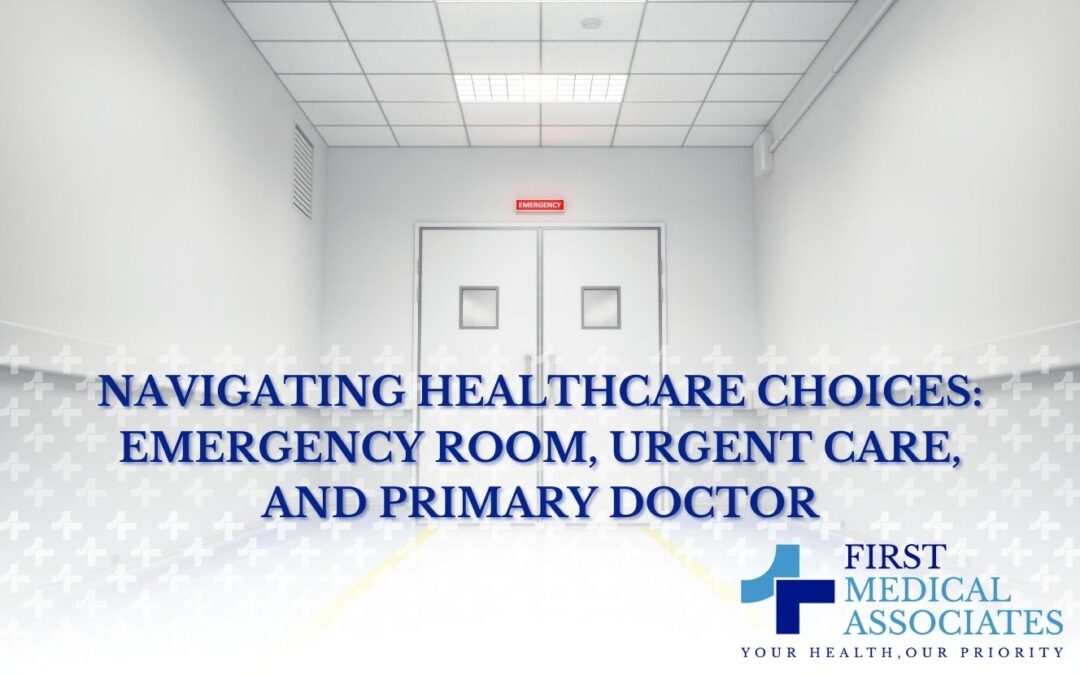Navigating Healthcare Choices in Maryland: ER, Urgent Care, and Primary Doctor
Navigating the healthcare landscape can be a difficult process, especially when faced with an unexpected medical situation. At First Medical Associates, individuals have several options when seeking medical care. Understanding the differences between the emergency room (ER), urgent care, and primary doctor can help you make informed decisions about your healthcare needs. In this blog, we will explore the characteristics of each healthcare option, their respective advantages, and when it’s appropriate to choose one over the other.
Emergency Room (ER)
The emergency room is often the first place that comes to mind when facing a severe medical issue. ERs are equipped to handle life-threatening emergencies, such as heart attacks, strokes, severe injuries, and other critical conditions. According to the best primary care physician in Germantown, MD, ERs are available 24/7 in most hospitals, ensuring access to emergency care at any time.
Advantages of the ER:
- Highly trained medical staff: ERs are staffed with doctors, nurses, and specialists who are experienced in handling critical situations.
- Advanced equipment and technology: ERs have access to state-of-the-art medical equipment, preparing them for complex procedures.
- Rapid response: ERs prioritize patients based on the severity of their condition, ensuring those in critical condition receive immediate attention.
When to Choose the ER:
- Severe chest pain
- Difficulty breathing
- Suspected stroke
- Major injuries or trauma
- Uncontrolled bleeding
- Any life-threatening condition
Urgent Care
Urgent care centers bridge the gap between the ER and primary care by offering immediate medical attention for non-life-threatening but urgent medical issues. Top family physicians in Silver Spring, MD, believe they are a more cost-effective and time-efficient option compared to the ER.
Advantages of Urgent Care
- Quick access to medical care: Urgent care centers typically have shorter wait times compared to ERs.
- Cost-effective: An urgent care visit’s cost is often lower than an ER visit’s.
- Wide range of services: Urgent Care can handle a variety of conditions, including minor injuries, infections, and illnesses.
- Extended hours: Many urgent care centers offer evening and weekend hours, making them convenient for busy schedules.
When to Choose Urgent Care:
- Minor injuries (sprains, minor fractures)
- Cuts and wounds that require stitches
- Minor illnesses (fever, sore throat, earache)
- Infections (UTIs, sinus infections)
- Mild allergic reactions
Primary Doctor
The best primary care physicians in Frederick, MD, often referred to as family doctors or general practitioners, play a crucial role in managing your overall health. They provide routine check-ups, manage chronic conditions, and offer preventative care.
Advantages of a Primary Doctor:
- Personalized care: Primary doctors get to know their patients’ medical histories and can provide personalized treatment plans.
- Continuity of care: They offer long-term care and monitor chronic conditions over time.
- Preventative care: Primary doctors focus on preventing illnesses through regular check-ups and screenings.
When to Choose a Primary Doctor:
- Routine check-ups and screenings
- Managing chronic conditions (diabetes, hypertension)
- Preventative care and vaccinations
- Non-urgent health concerns
At First Medical Associates, we understand that your healthcare options are essential for making informed decisions about your well-being. While the emergency room, urgent care, and primary doctor serve distinct purposes, choosing the right one depends on the nature and severity of your medical condition. By knowing when to seek care from each of these options, you can navigate the healthcare system more effectively and ensure you receive the appropriate level of care for your needs. Remember, in emergencies, always prioritize your safety and well-being by seeking immediate medical attention in the ER.

